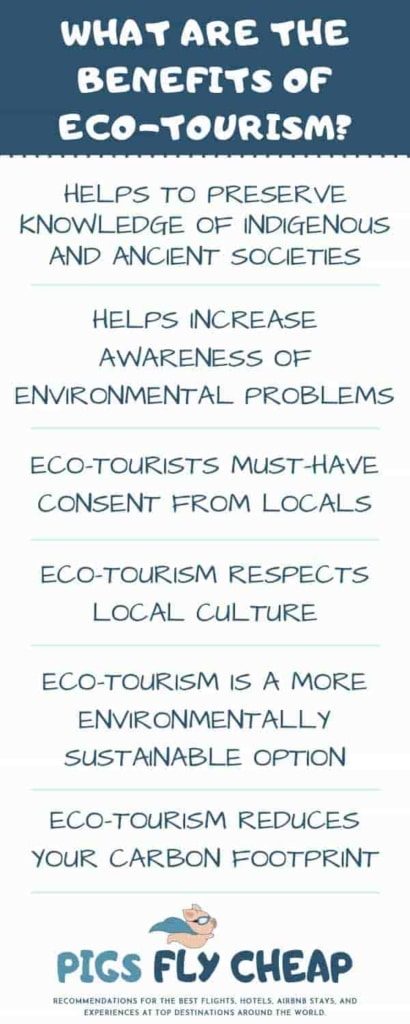Eco-tourism is a great way to travel. It benefits the world in so many different ways and leaves people feeling great. If you want to find out just how great eco-tourism is, you’re in the right place. What exactly is eco-tourism and what are the benefits?
EcoTourism is the act of traveling to natural areas responsibly. It is important because of its many benefits to the ecosystem, such as preserving indigenous and ancient societies and reducing carbon footprint. It is good for both the planet and the people on it.
Going on an eco-tour will give you the satisfaction of traveling while making the world a better place. If you’re planning to go on an eco-tour and want to know more about it, keep reading to learn more about the benefits of eco-tourism.
What is Eco-Tourism?
Eco-tourism, or sustainable tourism, is known as traveling through natural areas responsibly using a set of practices. Practices include making little to no impact on locals and providing respect and awareness to the culture.
Eco-tourism is a great way to explore the world around you without harming it. The practices of eco-tourism are what make it different from regular travel. Eco-tourism should follow the following guidelines:
- Make little to no impact on both locals – The reason why you want to make as little impact as possible on locals is that it is important to preserve their culture. Sometimes the little things that you do can completely change the culture of indigenous tribes. As a traveler, it is your responsibility to ensure that, while you are enjoying your time with the locals, you are not putting their culture at risk.
- Respect the culture and religious beliefs of indigenous tribes – Do not disrespect any of the local traditions, beliefs, and cultures. Do not try to convince locals that what they believe is wrong. This is also a part of preserving indigenous cultures and making little impact.
- Reduce environmentally harmful activities – Eco-tourism should ultimately be about bettering the world around you. Reducing the use of ecologically damaging activities is a big part of going on an eco-tour. There are plenty of ways that you can do this. Keep reading to find out more about how.
- Do not interact with wildlife – Do not try to feed or pet any wild animals. Attempting to do so may end up bad for both you and the animals.
- Support local businesses – Support local businesses by staying at accommodations owned by locals and buying from local businesses.
- Eat local food and drinks – Getting to taste new foods and local drinks will not only better your experience as a tourist, but it will also help to support local businesses as well.
These are the basic guidelines for eco-tourism. Some of these guidelines are less important than others. The most important guidelines are the first four you see on the list. If you find yourself unable to commit to these guidelines, it is highly suggested that you do not go on an eco-tour.
Between regular tourism, which is simply traveling to places for leisure, and eco-tourism, eco-tourism is the better option. There is so much good you can do by going on an eco-tour that you just can’t when regularly touring. Normal tourism doesn’t care at all for the world around us, while eco-tourism does so significantly and efficiently. Here are some ecotourism destinations to get you started.
What is the Meaning of an Eco-Resort or Lodge?
An eco-resort or lodge is a facility that takes extra care to help its natural surroundings. These facilities specialize in environmental sustainability and social responsibility, promoting both to visitors. Eco-resorts and eco-lodges are slightly different from each other but the terms are interchangeable.
Eco-resorts and lodges encourage visitors to help sustain the environment by making them aware of water and energy usage. For example, there are resorts that use solar panels to produce natural energy and are also self-sufficient water producers. They also encourage awareness of waste disposal.
The best thing about eco-resorts and lodges is that they are good for the environment, helping you to be good to the environment. This is what makes them so good to reside during eco-tours. They also contribute to teaching travelers more about bettering the environment.
The biggest difference between eco-resorts and eco-lodges is the space and the resources that are offered on-site. Resorts, in general, are usually larger than lodges and usually have more services offered, such as spas, indoor pools, etc. They are mostly the same in other regards. Both eco-resorts and lodges are equally environmentally responsible.
(If you are looking for a good eco-friendly place to stay, there are some eco lodges in Costa Rica for you to stay in on your next visit.)

Why is Eco-Resort Important?
Eco-resorts are important when participating in eco-tourism because of their benefits to the environment. Standard resorts do not take special care to help their natural surroundings and can damage the environment. Eco-resorts, on the other hand, were made for that purpose.
The purpose of eco-tourism is to help the environment. By visiting a regular resort, you are taking away from the ultimate goal of eco-tourism. Eco-resorts are there to help provide a great eco-tourism experience, among other things. Here is a list of some of the best eco-resorts in the world:
- Mashpi Lodge (Ecuador)
- Svart (Norway)
- Rondon Ridge, Mt Hagen (Papua New Guinea)
- Camp Glenorchy (New Zealand)
Whereas the options listed are considered the best eco-resorts globally, you might not be thinking about traveling to Ecuador or Norway. When searching for an eco-resort, here are some traits you should look for:
- Renewable Energy – The eco-resort you choose should make use of renewable energy sources such as solar panels. If they do not use equipment like solar panels, they should have systems to conserve energy in the best way possible.
- Non-toxic Cleaning Products – Services should use non-toxic cleaning products. The use of toxic cleaning products is harmful to the environment.
- Prohibits Smoking – Your eco-resort should prohibit smoking under all circumstances.
- Recycling – Eco-resorts should have recycling bins to help you safely get rid of recyclable waste.
- Waste Management – Eco-resorts should also have waste management systems to help you get rid of any non-recyclable waste.
These characteristics are not necessary to have but should be considered when choosing your eco-friendly resort. There are, of course, more things you can consider when choosing a resort, but these are some staple eco-resort traits that should pop into your mind during your search. If you are looking into any other options, check the best resorts list, see what they offer, and compare.
Another big reason why eco-resorts are so important is that they are also responsible for teaching visitors how to take better care of the world around them. In addition, the services they offer, such as waste management, contribute to helping people learn what and what not to do.
If you want to stay in the states and still be eco-friendly during your vacation, consider taking steps to reduce your carbon footprint. You can go on one of the best walking tours in the US, or you can try some places to camp near Chicago. Whatever you plan to do, there are plenty of ways you can do it while still being kind to the environment.
Benefits of Eco-Tourism
 Benefits of eco-tourism include reducing carbon footprint, traveling with no impact on the environment, helping increase awareness of the environment, etc. There are so many more benefits of eco-tourism that make it worth the while.
Benefits of eco-tourism include reducing carbon footprint, traveling with no impact on the environment, helping increase awareness of the environment, etc. There are so many more benefits of eco-tourism that make it worth the while.
The benefits of eco-tourism are what help make the experience invaluable. Knowing that you are bettering the environment as you adventure to different places is one of the most incredible feelings you can have. Telling you about all of the benefits of eco-tourism, although it would be well worth it, could take all day, but, to prepare you more for that great feeling of satisfaction, here are a few of the benefits of eco-tourism listed in more detail.
Eco-Tourism Reduces Your Carbon Footprint
Eco-tourism reduces carbon footprint using certain eco-tourism packages. These packages help travelers reduce the amount of carbon dioxide released during travel. This is a great way to go about traveling when eco-touring.
Carbon footprint refers to the amount of carbon dioxide and, or, other carbon melds left behind due to the use of fossil fuels. If you want to go eco-touring, be sure to ask your airline about eco-tourism packages. If you find that your airline does not provide eco-tourism packages, there are other ways to reduce your carbon footprint while traveling. There are also airport shuttle services that help to decrease gas emissions.
There are a lot of great shuttle services across the globe to help you reduce your carbon footprint. If you can’t seem to find any shuttle services that are affordable or any shuttle services at all, don’t give up just yet. Taking one long trip on a plane, rather than catching different flights, helps to reduce the carbon footprint you leave behind.
Helps to Preserve Knowledge of Indigenous and Ancient Societies
Eco-tourism helps preserve the knowledge of indigenous and ancient societies as the knowledge is passed down from locals to the traveler. As the travelers go to different places and interact with the locals, they will begin to learn more about the culture and its history.
Preservation of the indigenous and ancient societies is very important. It provides knowledge to the world that could ultimately be lost forever if not learned. Furthermore, gaining knowledge of different societies helps to increase our awareness of them and learn from different types of important history.
Preservation of the indigenous and ancient societies also helps the world’s biodiversity. The history of those cultures helps us to understand nature and the world around us. These elements of life, such as nature and agriculture, would be a lot harder to understand without that information.
Eco-Tourism Helps Increase Awareness of Environmental Problems
Eco-tourism helps to increase awareness of environmental problems such as climate change and ecological crisis. While eco-touring, people learn about the actions performed every day that can harm the environment as well as better alternatives.
Eco-tourism is not only a great experience for travelers to enjoy, but it is also an eye-opening experience. If you didn’t know anything about how damaging leaving a large carbon footprint can be to the environment, eco-tourism would help you learn all about it.
People can learn from eco-tourism because it helps to limit activities that can cause environmental damage. It promotes activities that help the environment and helps people distinguish between good activities and bad activities. Then, when people go home from their eco-tours, they know what to do to help better the world around them.
Eco-Tourists Must-Have Consent From Locals
Eco-tourists must always have consent from locals of the area they are touring. Although geared more toward the locals, this is an important benefit of eco-tourism because it shows that people cannot just come and explore their natural habitats without permission.
It is important to get permission from locals, whether you’re an anthropologist, sociologist, or eco-tourist. This allows for a better experience for both the locals and the travelers.
Eco-Tourism Respects Local Culture
All eco-tourists must respect the local culture. This benefit is geared more toward residents of the natural habitats visited but is still crucial to the traveler’s experience. Having the opportunity to experience the hidden culture of indigenous people is one of the best parts of eco-tourism.
Exploring different cultures is a part of the experience of eco-touring. It is important not to offend the locals by making rude comments about their culture as it not only ruins your experience but ruins theirs as well. It is showing the locals that you respect them will, in turn, make them respect you. Building relationships with locals and participating in their culture will make your experience eco-touring all the better.

Eco-Tourism is a More Environmentally Sustainable Option
Compared to normal methods of travel, eco-tourism is better for sustaining the environment. The practices of eco-tourism steer the traveler towards better environmental practices. Eco-resorts and airport shuttles are many of the environmentally sustainable options used by eco-tourists.
In general, the things that we do on this earth can be environmentally damaging. Traveling is just another one of those environmentally damaging activities that we choose to partake in. Eco-tourism gives people a way to reduce environmental damage while still doing what they love; traveling.
Conclusion
Eco-tourism is an altogether great way to travel. There are so many benefits that you just can’t pass up the opportunity. You get to learn about different cultures, improve the world around you, and have fun all at the same time. What better way is there to travel?


